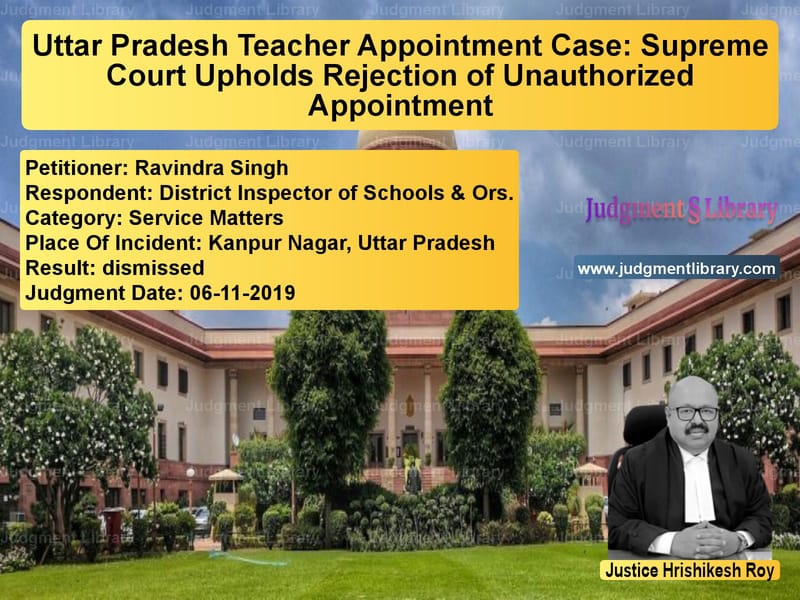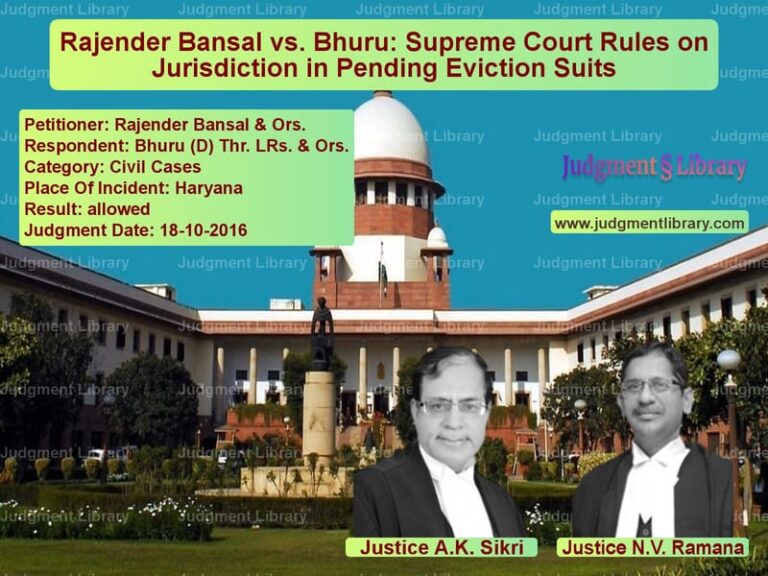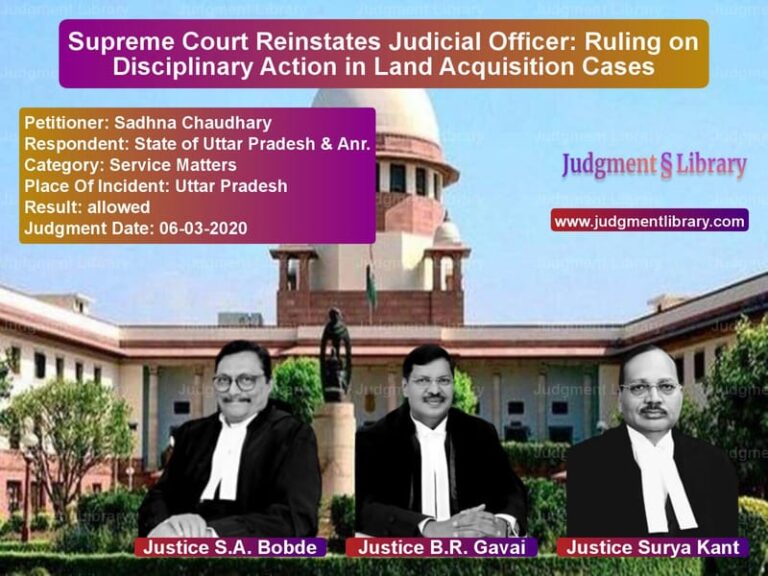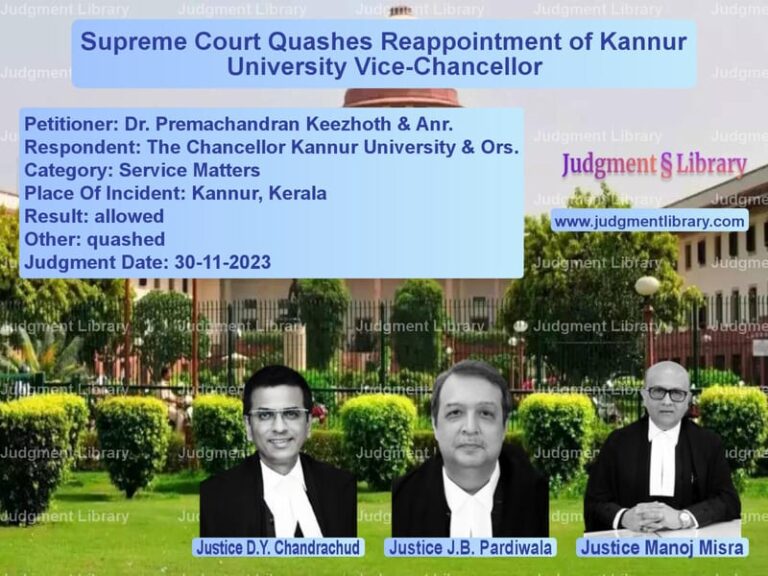Uttar Pradesh Teacher Appointment Case: Supreme Court Upholds Rejection of Unauthorized Appointment
The case of Ravindra Singh vs. District Inspector of Schools & Ors. revolved around the legality of an ad hoc teacher’s appointment in a government-aided educational institution in Uttar Pradesh. The Supreme Court had to determine whether the appointment complied with statutory recruitment procedures and whether the appellant was entitled to salary payments from the state.
The judgment examined the scope of the Uttar Pradesh Secondary Education Services Commission and Selection Boards Act, 1982 (hereinafter referred to as the “Act of 1982”) and the Uttar Pradesh Secondary Education Services Commission (Removal of Difficulties) Orders, 1981, which govern ad hoc appointments in government-aided schools.
Background of the Case
The appellant, Ravindra Singh, was appointed as an LT Grade Teacher at Bilhaur Inter College, Kanpur Nagar. His appointment followed the transfer of another teacher, Ramesh Chandra Pandey, creating a substantive vacancy.
However, the District Inspector of Schools (DIOS) rejected the appellant’s request for financial approval and salary disbursement on February 16, 2000, citing procedural violations. The DIOS reasoned that:
- The state government had imposed a recruitment ban at the time of the appointment.
- The institution’s management lacked authority to make direct appointments to substantive vacancies.
- The appointment did not comply with the recruitment process under Paragraph 5 of the First Removal of Difficulties Order, 1981.
The appellant challenged this decision before the Allahabad High Court, but both the Single Judge and Division Bench dismissed his petition. The appellant then approached the Supreme Court.
Petitioner’s Arguments (Ravindra Singh)
The appellant contended:
- He had been serving in the institution without remuneration since 1997 and was entitled to salary payments.
- The institution’s management had the authority to make ad hoc appointments.
- His selection followed an advertisement and interview process, making it a valid appointment.
- The High Court misinterpreted the ruling in Radha Raizada vs. Committee of Management, which permits ad hoc appointments under Section 18 of the Act of 1982.
Respondent’s Arguments (District Inspector of Schools & Uttar Pradesh Government)
The respondents countered:
- The appointment was made in violation of a government-imposed ban on recruitment.
- The management was required to notify vacancies to the Uttar Pradesh Secondary Education Services Commission and await its recommendations.
- Appointments to substantive vacancies must follow the recruitment process outlined in the First Removal of Difficulties Order, 1981.
- Paragraph 5 of the Order mandates that direct recruitment can only occur after promotion avenues are exhausted.
- The appellant’s appointment was unauthorized, and the state was not liable to pay his salary.
Supreme Court’s Judgment
The Supreme Court upheld the rejection of the appellant’s appointment, ruling that:
- Ad hoc appointments must comply with statutory recruitment procedures.
- The management failed to notify the vacancy to the Commission and did not adhere to Paragraph 5 of the First Removal of Difficulties Order.
- The state cannot be burdened with salary obligations for unauthorized appointments.
- The ruling in Radha Raizada, which requires adherence to statutory procedures for ad hoc appointments, was correctly applied by the High Court.
The Court stated:
“The state exchequer cannot be burdened with salary payments for appointments made in contravention of statutory provisions.”
Key Takeaways
- Educational institutions must follow statutory procedures for appointing teachers to substantive vacancies.
- Management committees cannot bypass recruitment processes, even during a government-imposed ban.
- The state is not liable to pay salaries for unauthorized appointments.
- The ruling reinforces the requirement for transparency and fairness in teacher recruitment in government-aided institutions.
- This judgment serves as a precedent in ensuring compliance with the Act of 1982 and related regulations.
The Supreme Court’s ruling clarifies the legal framework for teacher recruitment in Uttar Pradesh and reinforces the principle that government funds should only be allocated to duly appointed candidates.
Petitioner Name: Ravindra Singh.Respondent Name: District Inspector of Schools & Ors..Judgment By: Justice Hrishikesh Roy.Place Of Incident: Kanpur Nagar, Uttar Pradesh.Judgment Date: 06-11-2019.
Don’t miss out on the full details! Download the complete judgment in PDF format below and gain valuable insights instantly!
Download Judgment: Ravindra Singh vs District Inspector o Supreme Court of India Judgment Dated 06-11-2019.pdf
Direct Downlaod Judgment: Direct downlaod this Judgment
See all petitions in Recruitment Policies
See all petitions in Public Sector Employees
See all petitions in Employment Disputes
See all petitions in Judgment by Hrishikesh Roy
See all petitions in dismissed
See all petitions in supreme court of India judgments November 2019
See all petitions in 2019 judgments
See all posts in Service Matters Category
See all allowed petitions in Service Matters Category
See all Dismissed petitions in Service Matters Category
See all partially allowed petitions in Service Matters Category






